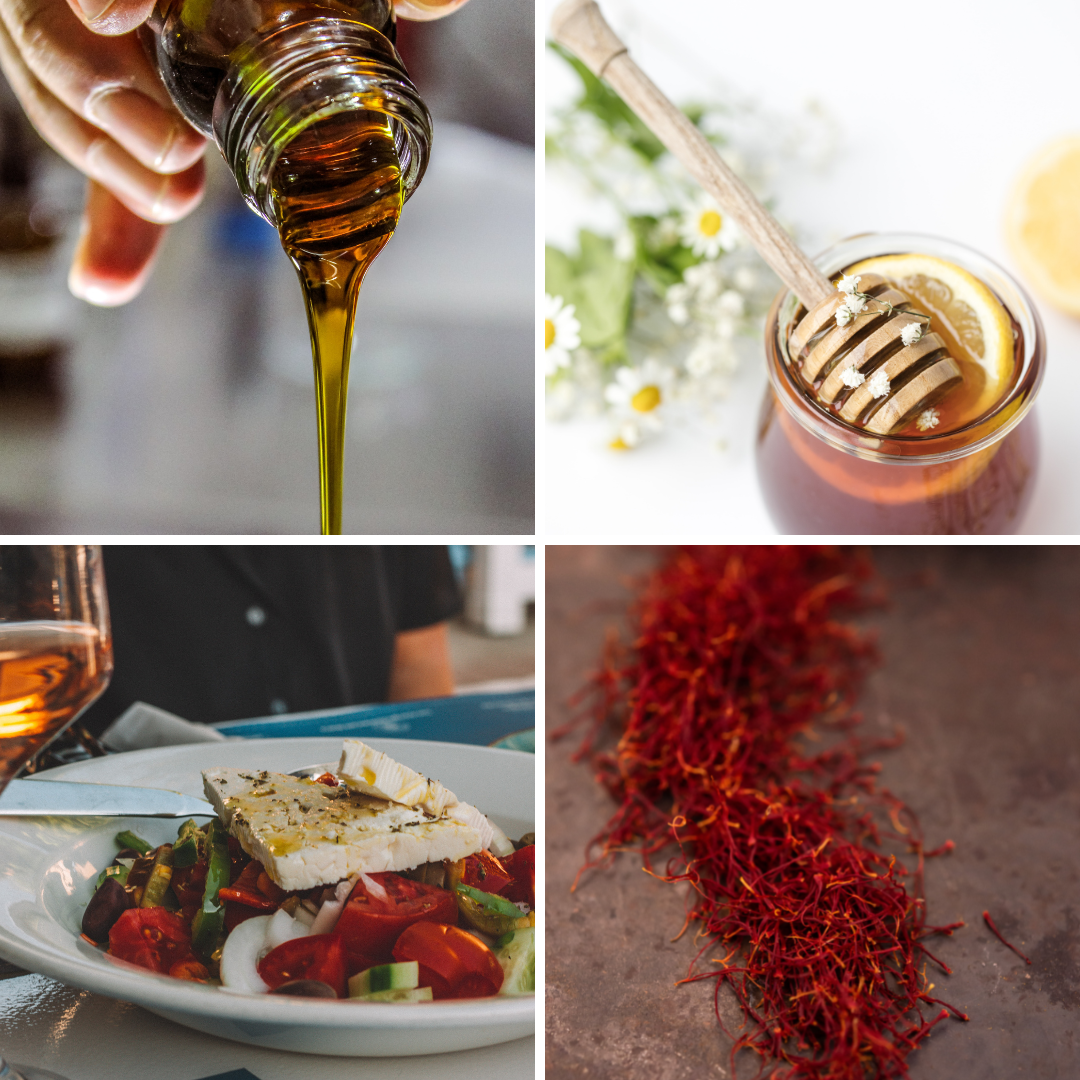START BOOKING YOUR TRIP TO
** Please note that we get a small commission if you book via our referral links. We use this to invest in new foodie content and to update the Greece Foodies website.
Greek cuisine is a vibrant mix of flavors and textures that will tantalize your taste buds. Greek products are known for their unique taste, quality ingredients, and freshness. Some popular Greek products include feta cheese, olives, yogurt, honey, mizithra cheese, baklava pastries, ouzo liquor, and Greek olive oil.
All these traditional Greek-featured products have been admired by many cultures across the globe for centuries. Whether you’re looking to spice up your kitchen or add something extra to your dish, Greek products are perfect for adding flavor and authenticity to any meal!
Most popular Greek products!
1. Feta Cheese
Feta cheese has a particularly unique position in the hearts of Greeks, and it has done so since Ancient Greece, thousands of years ago. It is one of Greece’s most—if not the most—exported products, and its provenance is worldwide recognized. Most people are unaware that for a white cheese to be named “feta,” it must be manufactured entirely of sheep’s milk or a blend of sheep’s and goat’s milk, with the goat milk content not surpassing 30%. The fat content varies from 30% to 60%, depending on the taste, with an average of roughly 45%.
Feta cheese has been registered as a protected designation of origin (PDO) by the European Commission. It should only come from certain prefectures of Greece and certain sheep and goat breeds, which means that the name ‘feta’ can no longer be used on cheeses of a similar composition made outside of Greece. My suggestion is to place some cheese on your pasta!
2. Olive oil
Olive oil has been shown to protect our cardiovascular system, prevent strokes, lower blood pressure, lower the risk of depression, maintain healthy cholesterol levels, and lower the risk of diabetes. Furthermore, it protects against Alzheimer’s disease, aids in the prevention of acute pancreatitis, and works proactively against several kinds of cancer, osteoporosis, and rheumatoid arthritis. Olive trees can be your alternative doctor!
Greek olive oil is good for frying since it is more robust than any other oil owing to its unique chemical structure. It possesses anti-aging qualities, promotes the growth of the central nervous system, and aids digestion. Not so awful, is it? Experts suggest two to three tablespoons of olive oil each day, which, contrary to common perception, has just nine calories per gram.
3. Greek Honey
Greek honey, whether served with the aforementioned Greek yogurt or on its own as a spoonful of energy, is one of the most known and delicious Greek goods across the globe owing to its incredible nutritional content and unrivaled flavor. Honey’s nutritional benefit has been recognized since antiquity. Honey was said to be the major component in Ambrosia, the diet of the Olympian gods in Greek mythology.
Furthermore, Hippocrates, the founder of medicine, highlighted honey’s nutritional and therapeutic potential by using it as a pharmaceutical product. A tablespoon of honey comprises just 21 calories. It is 30% sweeter than sugar, making it the most significant sweetener in the famed Mediterranean diet.
4. Mastic Raisin
Mastic resin has been gathered in Greece for at least 2,500 years. It is an important element of Greek culture, utilized in medicine and the country’s culinary legacy. The ‘tears of Chios,’ as they are well known, contain antioxidants and antibacterial and antifungal qualities. To this day, the mastic resin collection has its classic flavor. It is obtained by cutting the trunk of the mastic tree, which grows on the Greek island of Chios.
The mastic begins to flow, and after approximately 15 days, it has stabilized and is ready for collection. This procedure lasts from the middle of August until the middle of September. After that, the product is filtered, cleaned, piece by piece, and professionally distributed. Mastic is used in Greece’s liqueurs, spoon sweets, drinks, chewing gum, sweets, desserts, bread varieties, cheese, Turkish delight, and ice cream.
5. Wine
Greek vineyards are among the oldest in the world, producing wine for thousands of years. Greece has favorable environmental conditions for grape cultivation due to its geographical position in the temperate Mediterranean area.
Assyrtiko, Moschofilero, Agiorgitiko, Xinomavro, and hundreds of other lesser-known grape types endemic to Greece provide seasoned wine enthusiasts with a wonderful landscape for studying the variety and individuality of Greek wines.
6. Greek Red Saffron
Greece is the world’s leading producer of organic saffron. Kozani’s saffron was one of just fifteen European agricultural goods highlighted in a campaign to promote excellent European farm products beyond the European Union. Krokos Kozani’s key markets are Italy, Spain, the United States, and Australia. You can find this product in any shop in Greece!
Due to its fragrant, color, medicinal, and aphrodisiac capabilities, Krokos Kozanis is PDO protected and considered one of the rarest and most valuable spices bequeathed by ancient civilizations.
So, what do you think, will you give these Greek products a try?
Check out what Greece offers, and you won’t be disappointed!
















